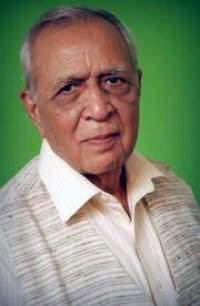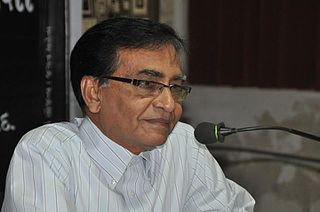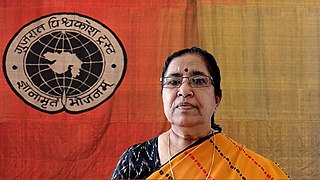
Kumarpal Balabhai Desai is an author, critic, editor, journalist, columnist and translator from Gujarat, India. He studied and later taught at the Gujarat University. He is associated with several social and Gujarati literary organisations such as Gujarati Sahitya Parishad. He has written and edited more than hundred books including biographies and several works on Jainism. He was awarded the Padma Shri in 2004.

Chunilal Madia was a Gujarati author from Gujarat, India, primarily known for his novels and short stories set in rural Saurashtra. Recipients of several awards, he is considered one of the leading writers of Gujarati literature.

Dhirendra Pritamlal Mehta is a Gujarati novelist, poet, critic and editor who received the 2010 Sahitya Akademi Award for Gujarati language for his novel Chhavni.

Bholabhai Patel was an Indian Gujarati author. He taught numerous languages at Gujarat University and did comparative studies of literature in different languages. He translated extensively and wrote essays and travelogues. He was awarded the Padma Shri in 2008.

Bhagwatikumar Sharma was an Indian author and journalist who wrote in Gujarati. Born in Surat and educated in languages, he edited a daily for several years. He wrote novels, short stories, poetry, essays and criticism. He received Ranjitram Suvarna Chandrak in 1984 and Sahitya Akademi Award in 1988.

Ramanlal Jethalal Joshi was Gujarati language literary critic and editor from India. He studied and later taught at Gujarat University in Ahmedabad. He served at several literary and educational institutions. He edited, authored and published criticism in more than forty-two books. He was awarded the Sahitya Akademi award in 1984.

Suman Shah is a Gujarati language critic, short story writer, novelist, essayist, editor and translator from Gujarat, India. He won the Sahitya Akademi Award in 2008 for his short story collection Fatfatiyun. He has written both in the modern and in the postmodern eras in Gujarati literature. He has authored more than 74 books, including 2 novels, 6 short story collections, 4 collections of creative essays, 6 translations into Gujarati from English and Hindi, 22 books on literary criticism and around 23 edited works of literary theory and modern Gujarati short stories and poems. He was honorary editor of Shabdasrishti from 1983 to 1986 and an editor of Khevna, a literary journal, from 1987 to 2009.
The Children's literature in Gujarati language of India has its roots in traditional folk literature, Puranic literature, epics and fables from Sanskrit literature. Following 1830s, the large number of stories and fables adapted and translated from various traditional and western sources started to appear in Gujarati. Led by Gijubhai Badheka and Nanabhai Bhatt, the children's literature expanded rapidly in form of stories, poems, rhymes and riddles. Several authors and poets wrote for children intermittently and exclusively. Large number of magazines catering to children were published by middle of twentieth century. Later adventure novels, science fiction, young-adult fiction were also published. Ramanlal Soni and Jivram Joshi contributed for five decades creating stories, fictional characters and novels. Few children's plays were published while the biographies of historical characters appeared frequently.

Chandrakant Sheth was an Indian Gujarati poet, essayist, critic, translator and editor from Gujarat. His pen names include Aryaputra, Nand Samavedi, Balchadra and Daksh Prajapati. He won the Sahitya Akademi Award for Gujarati in 1986 for his book Dhoolmani Paglio.

Vinesh Antani is Gujarati novelist, short story writer and essayist from Gujarat, India.

Jayant Sukhlal Kothari was a Gujarati literary critic from India.

Jayant Himmatlal Pathak was a Gujarati poet and literary critic from Gujarat, India. He was the president of the Gujarati Sahitya Parishad from 1990 – 1991. He received several awards, including the Sahitya Akademi Award, the Kumar Suvarna Chandrak, the Narmad Suvarna Chandrak, the Ranjitram Suvarna Chandrak and the Uma-Snehrashmi Prize. The Jayant Pathak Poetry Award is named after him.
Pramodkumar Bhagubhai Patel (1933–1996) was Gujarati language critic from Gujarat, India.

Manilal Haridas Patel is a Gujarati poet, essayist, novelist, and literary critic from Gujarat, India. He has won numerous awards for his work, including the 2007 Dhanji Kanji Gandhi Suvarna Chandrak literary medal for his significant contributions to Gujarati literature.

Jyotish Jagannath Jani was a Gujarati novelist, poet and short story writer from Gujarat, India.
Ravindra Parekh is a Gujarati short story writer, novelist, playwright, poet, critic and translator from Gujarat, India.

Mehul Surti in an Indian music composer and singer from Surat, Gujarat, India, known for his work in Gujarati cinema and Gujarati theatre. He has composed music for several successful Gujarati films including Kevi Rite Jaish (2012), Vitamin She (2017), Montu Ni Bittu (2019), Short Circuit (2019), and Hellaro (2019), 21mu Tiffin (2021) ,Kamthaan (2024),Kasoombo (2024).

Sharifa Vijaliwala is an Indian Gujarati language writer, critic, translator and editor from Surat, Gujarat, India. She is a recipient of a 2018 Sahitya Akademi Award for Vibhajanni Vyatha, a collection of critical essays in Gujarati, and has won several Gujarat Sahitya Akademi awards for her literary work.

Raman Kantilal Soni is a Gujarati literary critic and editor from Gujarat, India. He taught Gujarati at various colleges in Gujarat. He edited Pratyaksha, a literary criticism magazine, from 1991 to 2017. He has edited several collections of short stories and poetry as well as catalogs and writer-specific collections.
















